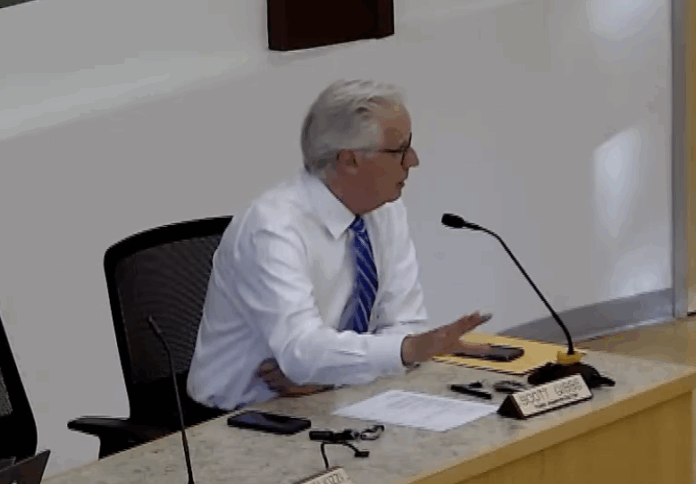NORTH SMITHFIELD – After four meetings and many hours of discussion, the Town Council approved a budget for the coming fiscal year that will feature a rate of $11.499 per thousand for residential taxpayers, down from $14.774 in the previous year.
The new rates will come with a small increase for some homeowners, but many will also see a decrease in their contributions. Town Administrator Scott Gibbs noted that residential values increase by 30 percent on average in the recent revaluation. Those whose values increased by more than 30 percent will see a tax increase, while those below the average will pay slightly less than last year.

“We have to keep in mind that what we’re looking at right now is a reduction in taxes for residential ratepayers,” said Gibbs, while presenting options for how to split the burden among categories of taxpayers to the town council, noting the change is an “aberration,” compared to other communities across the state. “Most of them are going up significantly.”
A vote on tax rates came after several days of line by line debate, which led to approval of a $55,352,785 budget, more than $400,000 less than Gibbs’s original proposal, and $2,317,759 more than last year’s fiscal plan.
Much of the savings from the original proposal came through the council’s decision on raises for non-union staff. Gibbs had recommended a variety of increases with larger raises for many staff members, while the Budget Committee recommended a 2.5 percent cost of living adjustment across the board. Councilors ultimately agreed to standardized raises at 3.25 percent with plans to further study the issue to inform their decisions in future years.
Gibbs, who initially made the case for attracting and retaining Town Hall talent, said that the council decision was not a problem for him. The administrator did object, however, to a proposal to eliminate funding to lease the town’s water hydrants, paid to the city of Woonsocket as the supplier. Citing a sudden rate increase and lack of routine maintenance, the Budget Committee had recommended holding back the payment.
“That completely works against the administration’s efforts to develop a working relationship with the city of Woonsocket, and for once and for all come up with a long term strategy in how to deal with the issue of the Union Village water system,” Gibbs said. “I need that rental fee in the budget.”
Gibbs said the town Water Department has received approval from the city to test the 49 hydrants in town to make sure all are in working order, the first step in addressing concerns about fire protection.
“We know some of the horror stories of a few we know were not functional as the result of a fire,” said Gibbs.
The cost for trash collection increased slightly this year, and Public Works Director Ray Pendergast said that was because the town’s original bid from Waste Management did not show the correct number of units in town, listing around 4,100 instead of the correct 4,700. The error, he noted, was not his own, and Pendergast said that the change in service providers in 2024 has nonetheless decreased the town’s overall cost for waste disposal, with no rejected recycling loads on the last report.
“Some cities and towns are really getting hit heavily with that,” said Pendergast. “We’re one of the few communities that’s not getting hit with all the rejections.”
Pendergast and Gibbs made the case, despite some debates, for setting aside funds for playground equipment at Pacheco Park. While the $50,000 allocated toward the expense is not enough to cover the needed parks improvement, Gibbs noted some grants may become available to help. Councilors also approved a capital expense of $17,000 for irrigation of the fields at North Smithfield Elementary School.
Councilor Rebecca DeCristofaro question an expense of $20,000 for the North Smithfield Heritage Association to replace two windows at Memorial Town Hall on Main St. Gibbs noted it was actually a good price considering the type of windows the organization needs to purchase for the ongoing restoration project.
Councilors decreased the line item for road repair from the recommended $1,000,000 to $900,000 in a cut pushed by Councilor John Beauregard, who noted that the town still had $300,000 for the expense left over from last year’s budget.
“We’re taxing people to have money sit around doing nothing,” Beauregard said.
The School Department received no increase in the town’s allocation this year, with operational needs fully funded by a rise in state aid of $1.5 million.
When it was all said and done, the tax levy had increased by just 1.99 percent – far below the state-mandated 4 percent cap.
Tax Assessor Jennifer George presented several options for how to divide the burden among categories of taxpayers, and councilors voted 4-1 to raise commercial rates to $16.936 per $1,000 in assessed value, with Beauregard casting the only dissent.
“We should send the message that we care about businesses, we welcome businesses and we’re going to take care of businesses,” Beauregard said in his case for splitting the burden more equally.
Water and sewer costs were also increased under the new fiscal plan, with the water user fee set at $10.52 per 1,000 gallons, up from $8.27, and sewer fees was set at $689.63 per equivalent dwelling unit.








